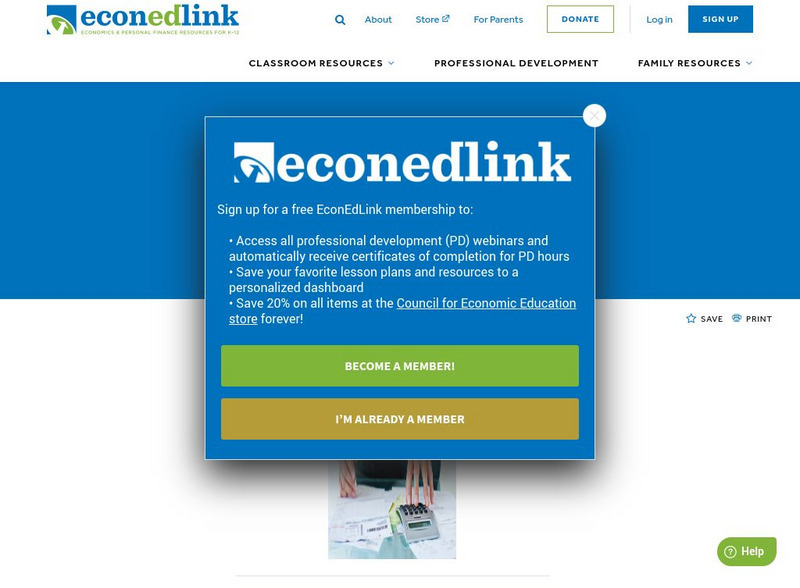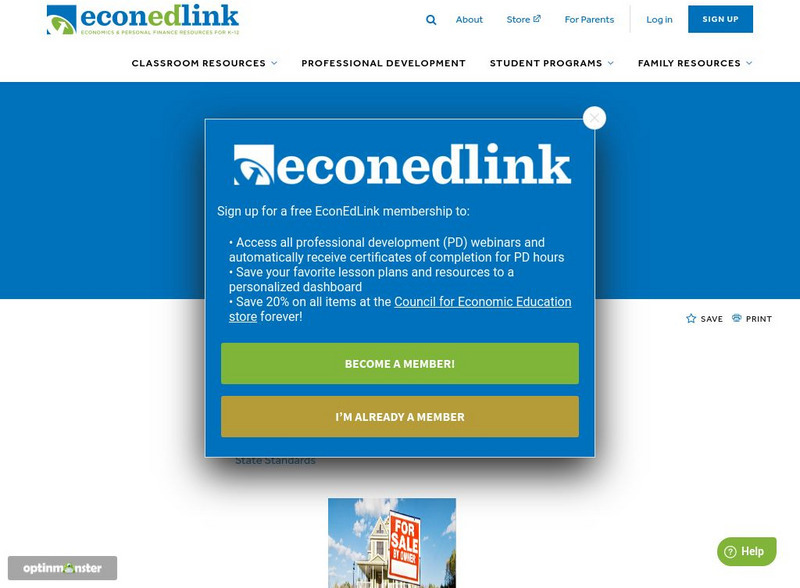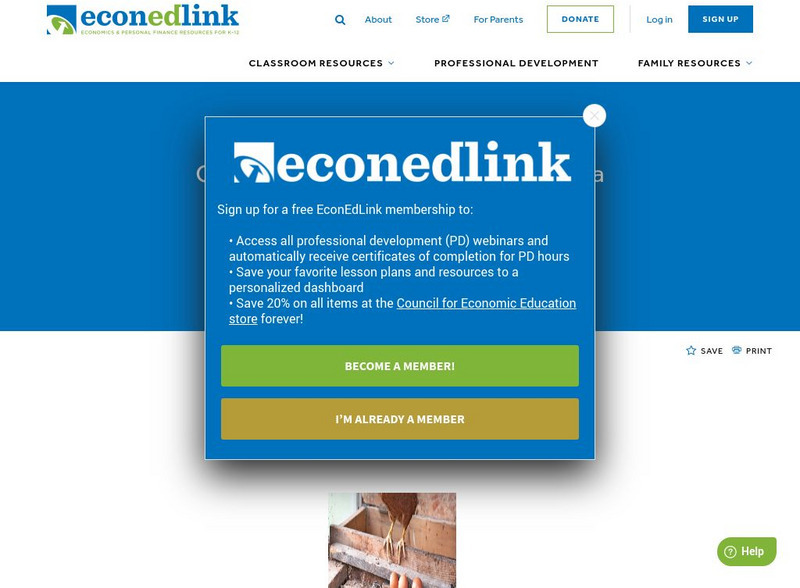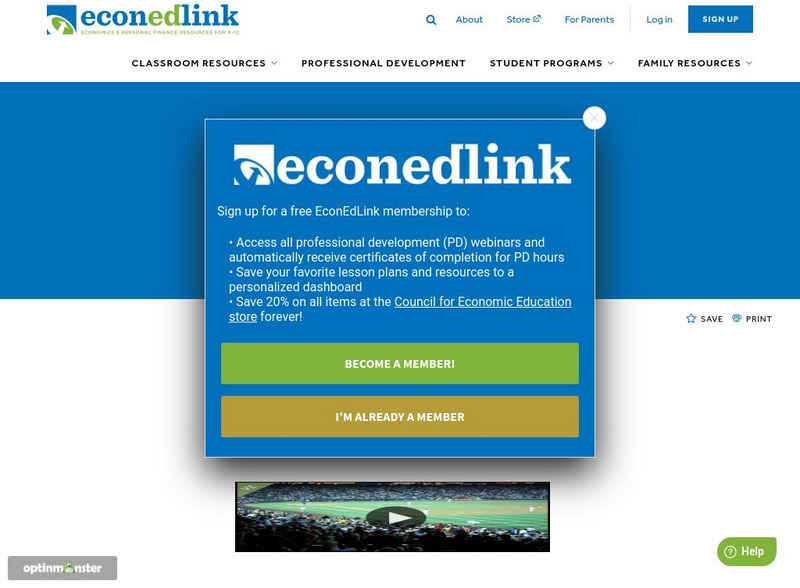Council for Economic Education
Econ Ed Link: Money Comes and Goes
Students read two online stories that introduce them to the elements of a budget and show that a successful budget balances money coming in (income) with money going out (expenses and savings). Follow-up activities point out the value of...
Wolters Kluwer
Small Business Guide: What Are Your Self Employment Taxes?
CCH Business Owner's Toolkit answers questions about self-employment taxes because "even if you don't hire anyone else to help you run your business, you're always going to have at least one employee, and that would be yourself."
Council for Economic Education
Econ Ed Link: Wages and Me
Students explore the reasons for differences in the wages for several occupations. Then students are guided through the Bureau of Labor Statistics website to find information about their potential careers and wage rates nationally and in...
Council for Economic Education
Econ Ed Link: The Economics of Income: The Rich Nations Mystery
Why are some countries very wealthy and others so poor? In this lesson you will learn about the factors that contribute to a nation's standard of living.
Council for Economic Education
Econ Ed Link: Booker T. Washington:"fifty Cents and a Dream"
Young Booker T. Washington had a dream. That dream was to use the resources at his disposal to earn the money necessary to get an education that would allow him and others to become financially secure. This lesson based on the picture...
Council for Economic Education
Econ Ed Link: Do I Look Like I'm Made of Money?
One of the most common replies given by parents when their children ask for money is "Do I look like I'm made of Money?" This lesson is designed to educate students about the need for money as a generally accepted medium of exchange. The...
Other
In Charge: Financial Literacy for Kids
The following lessons provide guidance, lesson plans, and activities for teachers interested in introducing financial literacy concepts to students in grades K-6.
Rice University
Cynthia Lanius at Rice University: The Million $ Mission
Here's a fun exercise on how to multiply your salary--a sample problem dealing with exponents and money.
Council for Economic Education
Econ Ed Link: The Economics of Income: Which 'Wood' You Choose?
A key turning point in a nation's economic development is when it starts to use its resources for long term versus short term purposes. A natural resource example is trees: should people use wood for cooking food or building homes?...
Council for Economic Education
Econ Ed Link: Buying vs. Renting
Have you given any thought to where you will live when you are "on your own" - out in the world earning a living? You will have many decisions to make as you look for a place to call home. In this lesson plan, your basic economic...
Council for Economic Education
Econ Ed Link: One Hen: How One Small Loan Made a Big Difference
The picture book One Hen: How One Small Loan Made a Big Difference, written by Kate Smith Milway, takes place in Africa. Here in a Ghanan village, young Kojo cannot afford to go to school after the death of his father. His resourceful...
Council for Economic Education
Econ Ed Link: Human Capital Concept Video and Quiz
Video [3:04] describing the concept of human capital as a combination of a person's education, knowledge, experience, health, habits, training and talent.
Council for Economic Education
Econ Ed Link: A Penny Saved Is a Penny at 4.7% Earned
There are lots of ways to receive income, and lots of ways to spend it. In this EconomicsMinute you will develop two budgets to help you decide how to allocate your income. Assuming you do not love making dollar bill rings.
McGraw Hill
Glencoe Corporation: Income Statement Case Study
This case study uses information from the Disney company to reinforce knowledge about corporation income statements. Additional activities in this case require Internet research.
Council for Economic Education
Econ Ed Link: An Investigation of Regional Housing Costs
This activity has students explore differences in regional housing costs, determine the percentage of gross income spent on housing, assess the impact of housing costs on a relocation decision and recognize wages and housing costs are...
Council for Economic Education
Econ Ed Link: Income Distribution
This video teaches the concept of Income Distribution. Income distribution refers to how the total income earned ends up divided over members of the economy. The website contains an interactive quiz and links for related lesson plans.
Council for Economic Education
Econ Ed Link: It Ain't Where You Start, It's What You Got, and Where You End
This year's federal elections will involve electing a president, all members of the House of Representatives, and one-third of the Senate. Barring some international crisis, economic issues appear likely to dominate the debates. In past...
Consumer Financial Protection Bureau
Consumer Financial Protection Bureau: Choosing How to Get Paid
Students explore and compare common payment methods and pay periods that employers use. They apply their learning by voting on their preferred methods in a class poll. Includes teaching guide and student worksheet that can be filled in...
Consumer Financial Protection Bureau
Consumer Financial Protection Bureau: Understanding Jobs, Teens, and Taxes
Learners review Internal Revenue Service webpages and respond to questions to explore the relationship between working and taxes.
Khan Academy
Khan Academy: Lesson Overview Cross Price Elasticity/income Elasticity of Demand
In a previous lesson we learned about price elasticity of demand, but there are many other types of elasticity that measure how agents respond to variables other than the change in a good's price. Two of these are Cross Price Elasticity...
Khan Academy
Khan Academy: Income Elasticity of Demand
Practice what you've learned about income elasticity of demand in this four-question exercise.
Federal Trade Commission
Federal Trade Commission: Consumer: Your Paycheck
When you work your employer pays you for doing your job with a paycheck. Learn how to cash it and the difference between gross pay and take-home pay.
University of Regina (Canada)
University of Regina: Math Central: Stewart Resources Centre: Consumer Wise [Pdf]
A tenth-grade math unit, developed in 1993 by a Saskatchewan teacher, on budgeting.
Other
Money Management International: The Berenstain Bears' Trouble With Money
A lesson plan featuring the Berenstain Bears that introduces the concepts of spending, goods, services, income, saving, and interest.
















